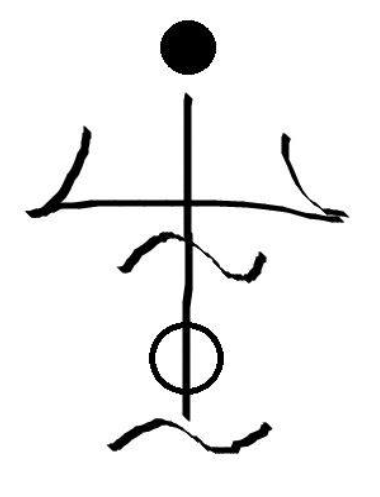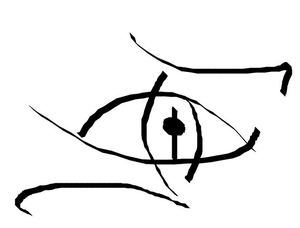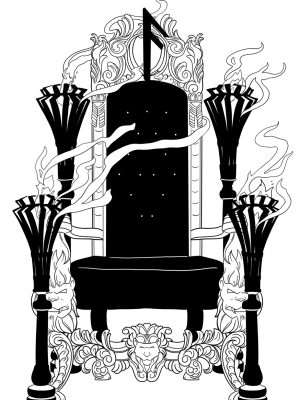The Church of Mankind
The Church of Mankind is a monotheistic faith that acknowledges humankind itself as intrinsically holy and innately perfect. A form of divine humanism, the Church of Mankind primarily espouses a brotherhood of all humankind toward a common purpose of a perfect human world. The Church of Mankind teaches that mankind is the literal physical embodiment of the Almighty Lord God of Creation, and that each human being shares a single common spirit.
Holy Benalus
Benalus was the king of Lethia, the temple city of the ancient world during the Age of Heroes. Upon being inspired with the idea that there is only one true God, the callow young king was exiled by the powerful priests of the innumerable religions that his message would disempower. Forced to flee into the eastern desert of Sha’ra, he returned wearing the pelt of a white desert lion a changed man, and proceeded to wage war upon the powers of the world.
Benalus’ war, the Eschaton, was about overthrowing the false religions of the ancient world and breaking the power of the cults which governed it. In the ancient world of the Age of Heroes, slavery by kings and cults was the societal norm to which Benalus’ message of a single almighty God and humanity’s role as a divine brotherhood was incompatible. Benalus freed slaves wherever he found them, recruiting more and more of these Manumit soldiers into his army in a great fire that set the world ablaze with war. In the end, Benalus was defeated at a final battle near the slave city of Hacona by a collected force of the greatest powers of that age – many of which would go on to rule the shattered world during the coming Age of Witchkings.
The Church of Mankind would later grow out of his teachings, forming the basis of the Lion Age, named after the white lion that became his war standard, and the founding of the Throne of God on Earth. The Church of Mankind now is the only acceptable religion for the vast majority of humankind, united under the ideals of the Throne, with only a few last holdouts in the far reaches of the world.
Benalus is not considered to be the object of direct worship in the Church of Mankind, but instead as its Prophet. Benalus, while touched by the divine and exceptionally wise, was an ideal and a teacher who showed mankind the way forward, but the actual pious worship goes to the God that he served.
Tenets Of The Faith
Those things with are human are divine, and the culture that humans naturally create through their lives and community are also divine. The world is damaged, however – fundamental aspects of it destroyed by the rebellion of the Triumvirate. The world is thus capable of influencing mankind away from its own divinity, and so vigilance is necessary against alien influences. These influences are obvious in some cases, such as the alien culture of elves, dwarves, orc, or any other non-human culture of the world. It can also come from more esoteric sources, such as the wicked entities of the Maleficarum, or the intervention of daemonic powers.
Humankind labored as slaves of daemonic powers for most of its history before the coming of the Prophet, and only now, in the Lion Age, is working to purge itself of the poisons of an evil world. Many old ways of thinking have to be unlearned in order to achieve the ideals of the Throne, and the Church’s purpose is to guide and steer mankind toward its true path
The Holy Orders
The Church’s mission is to reform the world in the image of a holy brotherhood of mankind, to create the new world that Benalus described in his sermons, a throne for God. This is not an ideal or an academic theory. For the priests of the Church of Mankind, this is a massive engineering project unlike the world has ever seen before, and every action they take is a coordinated effort across leagues and nations to shift and steer all human culture toward this end. To be a priest of mankind is to be an ardent, a scientist, a leader, a philosopher, a spy, a warrior, a teacher and a parent, guiding, shaping, and above all, changing the world from imperfect to perfect.
A perfect human world means a perfect humankind, where culture and structure makes the act of sin impossible. A world without wrath must be a world without war, where all mankind is unified under a single “us” with no “thems” remaining. A world without greed means a world where scarcity is banished, where food is plentiful and basic needs are provided for by those around oneself, even as they provide for others.
This holy mission requires incredible foresight and prescience. Priests think and plan in terms of decades, centuries and millennia, trying to account for future inventions and ideas that may shift the culture, and get ahead of those inventions to condition the world to receive them correctly. What will the world be like after an inevitable printing or literacy revolution? What will be the effects of a unified Rogalia? Under which monarch must it unify to ensure a benign reign, and after what other conditions are met to ensure that? How can we advance past rival races like elves or dwarves without adopting their ways and changing who we are? How can a commercial culture like Hestralia be transitioned out of exploitative capitalism? How can we do that while also learning the lessons that Hestralia can teach humanity?
The answers to these questions require centuries of careful planning, and an utter dedication to a resilient and unchanging message in order to resist the mighty cultural forces that have shaped the world up until the Lion Age. Even with all the power of the Church, the challenges of untold future ages and the shepherding of millions of unique souls requires the labor, and the faith, of these dedicated servants of mankind.
The final mission is to people the whole of the earth with human souls, tame every wild land, drive back every shadow with God’s light, and create a unified, perfect mankind. Fertility is valued, as the expansion of humanity and the Throne requires ever greater numbers, and the multiplication of the human spirit is an innately good act.
The Shared Divinity Of Mankind
Mankind is a single spirit across many souls, and when a person harms another in some way, they are actually doing harm to themselves. Sins against Mankind are sins against one’s own soul, and the perfect world that the Church strives to create will overcome the impulse to see others as other.
Mankind, being inherently unified in spirit, is also equal in spirit, and there are no greater or lesser people. The relic practices of the ancient world to dominate based on cultures, on caste, or on gender are against the mission of the Church, though they have not been totally eliminated from culture yet. In the Throne, women are equally legally able to inherit wealth or position, though in practice males often still hold most positions of official authority, especially among the nobility, though the practice fades more with each generation.
As well, human sexuality, within the sacred bond of marriage, is permitted in whichever way the soul is inspired. Marriage and love is sanctified between any two consenting souls, regardless of sex or gender. Such matched couples are encouraged to use adoption to contribute to the creation and protection of new human life.
The Ecclesiarchal Covenants
In pursuit of its holy orders, the Church has specialized missionary orders called Covenants. These organizations work as semi-autonomous departments of the Church, each responsible for a certain aspect of the holy orders. Priests of Mankind join a single Covenant when they take their vows, and progress in rank and responsibility within that Covenant’s mission, but their rank is considered to be held universally across the entire clergy.
Each Covenant has one of the seven Archangels as their patron, and venerates one of the Exalted Saints, individuals who had some kind of spiritual contact with an Archangel and submit their lives to Their will, being assisted by miracles granted by their patron Archangel. In venerating the Exalted Saint and submitting their lives in service to that Archangel in imitation of the Exalted Saint, the Priest hopes to achieve a spiritual likeness to the Exalted Saint, and thus beg miracles of the Archangel.
The first and most important likeness of the Exalted Saint’s life that a priest must take is the swearing of a Covenant, a sacred and holy oath before God of a certain set of behaviors they must always uphold. Each of the religious orders has a specific Covenant that they ask of their priests. Should the priest break this sacred oath, they sever themselves from the Archangel’s grace in order to not taint Them with their failure, and must atone for their transgression in order to regain their place as a loyal servant.
MELANDIHIM, THE MENDICANT FRIARS
The Mendicant Friars, or the Melandihim, travel the Throne ministering to the distant and the forgotten; the poor, the marginalized, the remote, the weak, the helpless. They live humble lives, and do not accept any form of recompense for their work. In the past, they have been something of a firebrand for social change, especially as rallying points to organize the people against injustice or oppression.
The Friars’ message is the virtue of pilgrimage – that the journey of life is the most important thing. It is a message of forgiveness and understanding, but also a message about progress, and is not tolerant of those who have given up on improvement, or tried to surround themselves with luxuries to achieve a life of ease. Every failure is forgivable, if you stand up, take the next step, and do better.
The Melandihim are some of the strongest critics against groups such as the trade Guilds and the nobility, some of whom they believe have forgotten the mission of Mankind. They have been known to incite the public to anger against these groups, for they usually have extremely large followings by other Priest’s standards, although they never advocate direct violence. Some Priests gather great followings of flagellants, walking the countryside barefoot, making an example of their humble lives to others, while using the mortification of their own flesh as a means to make their journey even more profound.

Sanctae Viae, Virtue of Pilgrimage
Covenant of Poverty
A member of the Melandihim may never accept payment for any service be it spiritual or practical, either in coin or in barter. They may accept donations freely offered, but may not take them as a form of exchange.
Mendicants may earn a Melandihim Achievement whenever they shame someone into a virtuous path without violence. Melandihim Achievements may be spent as Priest Achievements, or to learn the Sacred Rites of Melandiel.
SEPHARIHIM, THE INQUISITION
The Sepharahim count as a Villain Concept, and it requires additional Glory to enter play as an Inquisitor.
The Inquisition, or the Sepharihim, are the Church’s last line of defense against heresy. Their solemn task is to route out heresy, wherever it can be found, and destroy it – its proponents, those it corrupted, its records, its writings, its remnants, and to bury the ashes away from the light forever. Heretical faiths, especially the Triumvirate of Thorns – anathema – pose such a threat to the sanctity of the Church and humankind that Inquisitors are given incredible disruptive power and legal authority to undertake their mission.
The Inquisition is rightly feared the world over, even among the faithful and the mighty. While they are agents of the Church, all nobles of the Throne swear in their oaths to uphold the religion of Benalus and the Church of Mankind as the only religious doctrine permissible in their realms. The Inquisition, as ultimate arbiters of the faith, thus have power to mandate action – or at least forbearance as they do their work – from even nobles in their own land when it comes to the prosecution of their quarry. Any who would get in their way certainly invite the question as to why someone would protect a heretic if they did not also have heretical sympathies.

While it is commonly believed that the role of the Inquisition is simply to hunt down heretics, their role is more subtly understood to be the Church’s censorship bureau, ensuring that dangerous ideas, whatever their form, do not enter general circulation. The Church’s holy mission requires thousands of years of progress toward an eventual perfect world, and the danger of a single idea poisoning that path and taking it off course is enormous. It is just as much their task to destroy the heretic as it is to ensure that seditious ideas do not take root, and for the same reason. The Inquisition does that hardest of tasks – what can be and what cannot, what is permissible and what is not, and how many must die to ensure that a single heretic and their poison ideas dies with them.
Eternal Heresy is the one sin for which their can be no atonement – no atonement save one. The sacred fire of the lord burns away the sins of those it touches, and as it consumes the heart, the soul is made clean through forced absolution. Those the Inquisitor puts to sacred flame can be purified and cleansed enough to see Heaven, regardless of their sins in life. It is for this reason that those innocents who must burn next to a witch for lack of definitive proof of the witch’s identity can do so with a light heart.
The Hexenhammer
Covenant of Authority
A member of the Sepharahim Must never acknowledge the authority of any being save God, the Emperor, The Pontifex, or a more senior member of the Inquisition.
LURIHIM, THE HOSPITALIER
The Hospitalier Priests, or the Lurihim, are the attendants of the Archangel of Death, Lurian. The Hospitalier practice sacred medicine – the divisions, adhesions and tensions of the human body, and how to pray to Lurian to forebear the time of death, and thus, heal the body.
Hospitalier have many ways to treat the hurts and harms of the living form, but this is not their only duty. The Hospitalier also care for those already dead, and are the tenders of graveyards and overseers of funerals. The Lurihim venerate the bones and other preserved relics of the dead, and may pray for guidance from those righteous fallen who have rejoined the Lord.
The teachings of St. Istra of Agnis, the patroness of their Covenant, are that every person has a choice between dealing death or giving life, and that life should be cultivated but neither that death is not to be feared. Death must happen in its own time, with its own means, and while we may beg Lurian for more time to make a better world, this place and the time we spend in it are fleeting, and all belong to Him before long.
The Lurihim operate hospitals throughout the Throne, which are usually based out of the local church. Their clerical arm, Curia Remedium, also performs research into how diseases and other wicked spiritual possessions enter the human form, and how best to banish them.

The Words of Saint Istra, the Hospitalier
Covenant of Quietude
A member of the Lurihim must never take up arms or Initiate violence against their fellow man and may only fight to incapacitate in the defense of themselves or others.
Hospitalier Priests may earn a Lurihim Achievement when the record the last words of the dying. The Lurihim must record every word that their patient spoke during the Last Breath, and write it in a tome that belongs with the diocese.
NURANIHIM, THE SACROSANCTUM EXORCISTS
The Sacrosanctum Exorcists, or the Nuranihim, protect humanity from dark spirits, curses, and other forms of dark powers that emerge in the form of the Night Malefic. They serve as exorcists, curse-breakers and monster hunters on behalf of the Church, and have to be experts in the lore of dark things and places. For this reason, the Church cautiously trusts them with some of their archives of collected lore as it might pertain to their duties, though they are kept a close eye upon by their own brethren, and those of the other Covenants, to ensure they remain on the right path.
Because of the nature of their work, Sacrosanctum Exorcists often have to delve into long-forgotten histories and places in order to find the answers to undo a curse or destroy a lingering evil. Nuranihim tend to be trained in combat, research, and archaeology in order to get the information they need, and then finally perform the dangerous task of attempting to cleanse a wickedness from the world.
Exorcists use their rituals and knowledge to get closer to the answers they need and to defend themselves and others from powerful Malefic creatures. Their prayers and holy tools get them closer to the answers of what happened, and how it can all be set right again, or else some measure of poetic justice delivered.

THE Sacrosanctum, Gospel of Redemption
Covenant of Chastity
A member of the Nuranihim must never take a spouse and must remain celibate at all times.
Sacrosanctum Exorcists may earn a Nuranihim Achievement whenever they resolve and lay to rest a Malificarum or break a curse. Nuranahim Achievements may be spent as Priest Achievements, or to learn the Sacred Rites of Nuraniel.
MITHRIHIM, THE WARRIOR PRIESTS
The Warrior Priests of Mithriel, or the Mithrihim, serve as chaplains, commanders, soldiers and judges in the faith. They serve alongside military commanders and advise them on military strategy, but also act as conscience and overseer to ensure that the war underway is no more destructive than it needs to be, and that the commander upholds the codes of war. Warrior Priests minister to both soldiers and prisoners of war alike, ensuring that the spiritual mission of Mankind is maintained, even in the tragic time of war when brother slays brother on the fields of battle. In the armies of Lethia, Warrior Priests serve as commanders themselves.
Within towns and cities, Warrior Priests often specialize in the lives of veterans, ensuring those war-haunted souls can manage their return to normal life – and indeed, that they remember to see it as normal life, and not normalize the life of a soldier instead. In times of civic crisis, whether it’s an attack on a civilian town, a fire or flood, or some other calamity, Warrior Priests can be found taking command of the people and inspiring order with effectiveness earned on the battlefield.

Warrior Priests are also called upon during ecclesiastical trial, or even to consult for other Priests for the most difficult cases of sin. More than any other Covenant, the Mithrihim know that the world is not yet perfect enough to allow mankind the foresight to prevent all sin. Sin will happen, and there are even some exceptions to events normally considered sinful. Warrior Priests are trusted with considering these events and making the difficult call to act as judge, as Dumal himself did.
The Book of Dumal, The Warrior Saint
Dumal was Benalus’ most loyal and dedicated general. The book of Dumal was penned by the scribe, Innotus, on Dumal’s death bed. It speaks of how to live with the burdens of war upon you and how, even in times of strife, one cannot compromise his faith. It touches on peace by any means, using war as a necessity only when all else has been lost; for there is no greater tragedy than mankind’s own pride and greed subverting the will of God.
Covenant of Mercy
A member of the Mithrihim must always grant protection to those that surrender to her and ensure that no harm comes to them as long as they continue to yield, no matter who they are.
Warrior Priests may earn a Mithrihim Achievement whenever they negotiate a peace between two factions that have used violence upon one another. Mithrihim Achievements may be spent as Priest Achievements, or to learn the Sacred Rites of Mithriel.
CYANAHIM, THE KEEPERS
the Keepers of Fate, or the Cyanahim, are coordinators, planners, and sometimes, assassins on behalf of the Church. Their mission is to eliminate any obstacle in the way of achieving the Holy Orders, the perfection of the Throne of God on Earth. Unlike the other Covenants, Keepers claim to be in regular and close contact with the Archangel Cyaniel, who takes a personal interest in assisting the order. They perceive Cyaniel’s will by interpreting portents and omens, but chiefly through astrological signs. They further assist the Archangel by curving the sacred seal of the Eye of Cyaniel upon hidden surfaces, which allows the Archangel an additional vantage from which to view the world and refine Their approach.
The Keepers are known to have conspiracies spanning across years and multitudes, carefully recording and acting on behalf of Cyaniel’s will once they have received a portent from Them. In times they act through manipulation of events, carefully conditioning circumstances until outcomes favor their cause. Their ability to anticipate the actions and decisions of others allows them to force their foes into positions where the danger they represent simply fails to manifest.

In other cases, Keepers act more directly, eliminating a threat through a surgical application of violence. When acting in accordance with the plan of Cyaniel on behalf of the holy future of the Throne, such acts of violence are morally clean, as they are not against the greater good of humanity, but in concert with it. If the Keepers do their job well – and they usually do – it never comes to such a thing; instead the mark of the Eye is all that remains of evidence that there was ever a threat to begin with, gone now from a carefully pruned path of fate.
Keepers are known to be very mysterious, spending long periods alone in stargazing or reflection, often from a very high tower or other vantage, and often speaking very little and revealing even less. When asked why, the Keepers are characteristically vague, but it is believed by some that as they act as the tool of fate, every action they take ripples out into the infinite, potentially changing the course of history. Those endowed with such a profound mission must take every care not to influence events in a way that puts it outside the control of their order.
The Last Testament of Decimus
Covenant of Silence
A Member of the Cyanahim must never reveal a secret that they know.
The Cyanahim Covenant does not include private personal information about themselves, but does include anything about any other subject that is known by very few people, or learned illicitly. This also means they can never explain their own motives for a request or an action if doing so means they must reveal secret information.
Keepers may earn a Cyanahim Achievement whenever they drive out or defeat a conspiracy or threat to the goals of the Throne. Cyanahim Achievements may be spent as Priest Achievements, or to learn the Sacred Rites of Cyaniel.
